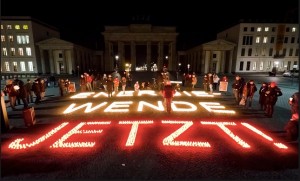Day of Reckoning: Germany’s energiewende
Last month we wrote in ieBLOG about a report from the Swiss-based bank, UBS, on what the future (several decades) electricity market will look like, and who will be the winners and losers. In a similar vein, Justin Gillis has written a piece for the New York Times (13 Sept 2014) on “Sun and Wind Alter Landscape, Leaving Utilities Behind.” Gillis focuses on the German government’s push for renewable energy (especially in light of its rejection of nuclear power) and finds that the push is producing impressive results.
Currently Germany gets 25% of its energy from renewable sources, it expects soon to get 30%, and it has set a target of 40% from renewables by 2025. Even in the US, California has set a realistic target of 33% renewable power by 2020.
The push in Germany has created a huge demand for wind turbines and solar panels that is driving down the prices for these energy materials. For example, solar panels have dropped in cost by 70% in past 5 years.
Where does this leave the traditional power/energy companies? Their corporate bodies have been fed by cheap fossil fuels for decades, but they are now finding, like the rest of us, that the diet is deadly (think high fat, high cholesterol, high carbohydrates). Moreover, they are finally realizing that the transformation (or is it truly a revolution) of their business is being driven more by the explosive growth of technology, which they don’t control, than by government policy, which they are used to influencing, if not indeed controlling.
Technologically speaking, the power companies are used to making a ton of money from power demand at peak hours, when electricity is expensive (and profits high). But when solar power becomes readily available, it can be used at peak demand times for a fraction of the cost of fossil-fuel-driven power. Cheaper energy (for consumers) means less profit (for power companies).
Also putting pressure on the traditional power business are other technological developments. Unlike the past (a decade or so), contemporary consumers of electricity have available to them a range of apps and advances that allow them, for example, to manage their home thermostats from a mobile device while at work. So consumers can affect the peak demand that used to, but doesn’t any more, provide a substantial profit base for the power companies. Smart chips in appliances (as for example with dish washers) can switch on only when power is plentiful and prices low. That saves the consumer money, but again costs the energy company profits. Just think what can happen when your ordinary decent consumers can control energy demand events from their new Apple wrist watch. Move over Dick Tracy.
The smart power companies are embracing renewable sources of energy and trying to figure out how they can still make money in a world dominated by renewable energy. They are also arguing, with some reasonableness, that they should be paid to keep their outdated plants on standby for times when the sun doesn’t shine or the wind blow (or the waves and tides recede). This is like paying your lawyer a retainer to keep her on your side when things go wrong and you need her right away.
The handwriting does seem to be on the wall: wind and sun are coming to be the central sources of power everywhere. For those power companies who reject renewables and insist on still eating fossil fuels for breakfast, lunch, and dinner that’s not an easy message to take in.
As a result, we can expect an aggressive and deep-funded fight against any support, financial or otherwise, for renewables from the regressive energy companies, like the Koch Brothers in the US. It may be the case that even these regressive companies are just buying time over a short period, to continue to make lots of money until the day of reckoning arrives, as they likely know it’s coming. Nevertheless, they continue to irresponsibly fight every small step to advance society’s renewable energy goals. The earth does not have the time to spare.
Maybe it’s time for a boycott of such companies, as Bishop Tutu has suggested.
Sources:
“Want a look at the new, de-centralised renewable electricity world that’s coming? Check out UBS report.” In ieBLOG section of irish environment magazine (Sept. 2014). www.irishenvironment.com/blog/want-look-new-de-centralised-renewable-electricity-world-thats-coming-check-ubs-report/
Justin Gillis, “Sun and Wind Alter Global Landscape, Leaving Energy Utilities Behind,” New York Times (13 Sept 2014). www.nytimes.com/2014/09/14/science/earth/sun-and-wind-alter-german-landscape-leaving-utilities-behind.html
Robin McKie, “Desmond Tutu calls for tactics that beat apartheid to be used in climate fight,” The Guardian (20 Sept 2014). www.theguardian.com/environment/2014/sep/21/desmond-tutu-climate-change-united-nations




No comments yet, add your own below